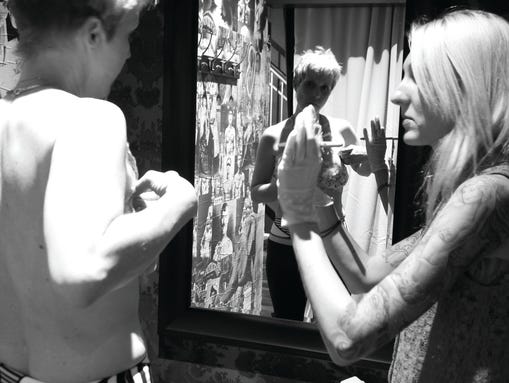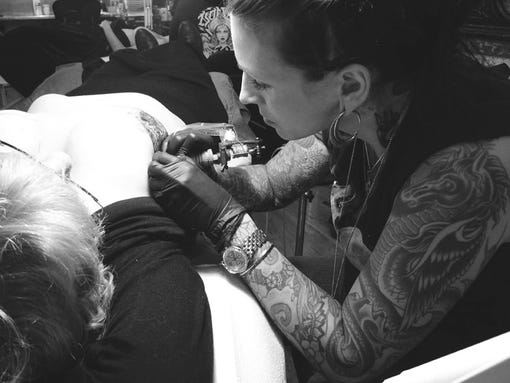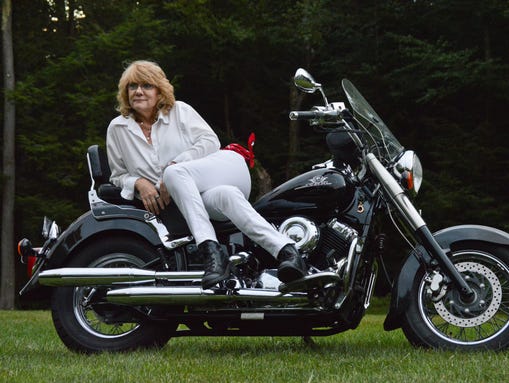Chérie Martyn is quick to mention she's "not a tattoo person." She knows plenty of people who have tattoos, including some of her fellow Connecticut motorcycle enthusiasts, but they were never her thing. They weren't, that is, until last October, when she decided to cover the scars from a bilateral mastectomy she'd had almost three years before.
Tattoo artist Shannon Purvis Barron has been giving breast-cancer survivors tattoos for years in her Columbia, S.C., studio. A lifelong artist, she shifted her focus in college from oil and canvas to ink and skin. She's seen up close the toll breast cancer can take on women's bodies and spirits. She can't even count the number of scars she has covered with flowers, tree branches and feathers, or botched nipple tattoos she's fixed. After she finishes their tattoos, Barron says, survivors often say the same thing: "Thank you for making me whole again."
These two women, who now share a remarkable bond, might never have met if not for the event last October that brought them together. P.ink Day is a component of the nonprofit organization P.ink, or Personal Ink, which connects breast-cancer survivors who want mastectomy tattoos with skilled tattoo artists.
Women don't have to live with the scars from breast-cancer surgeries if they don't want to, says P.ink founder Noel Franus. "We want to change the culture of healing," he says.
Franus' inspiration for P.ink was intensely personal. Four years ago, his sister-in-law Molly learned her nipples would be removed as part of her mastectomy. Her doctor offered to tattoo new areolas following reconstructive surgery. She had questions and asked her family to weigh in: Would the tattoos look good? Instead of new nipples, should she get something that was a bit more fun and splashy — a bit more her?

The P.ink organization believes tattoos can help with healing. Here, a breast cancer survivor works with a tattoo artist to determine the right design for her body.(Photo: P.ink)
As the vice president of experience design at the advertising agency Crispin Porter + Bogusky (CPB) in Boulder, Colo., Franus is nothing if not a creative thinker. He knew if his sister-in-law had these questions, other women did, too. "That's when I had a little bit of a lightbulb go on," he says. He imagined a web platform for breast-cancer survivors "that might change their perceptions about what tattoos are and who they're for."
Franus took the idea to his colleagues at CPB, and they started researching, planning and creating. The image-driven social media platform Pinterest proved to be perfect, and P.ink launched there in February 2013. Women considering mastectomy tattoos could peruse curated boards of designs and bios of P.ink-vetted tattoo artists.
"The idea is that once you're inspired to take the next step, hopefully you can find someone near you to help you see it through," Franus says.
When women have trouble locating an artist, P.ink helps them find one. Beginning last year, it also hosted a tattooing event to be held every October during Breast Cancer Awareness Month, called P.ink Day. For the inaugural P.ink Day, at Saved Tattoo in Brooklyn, the organization raised money to provide mastectomy tattoos for 10 survivors by 10 artists from around the country.

Tattoo artist Shannon Purvis Barron works on Martyn at P.ink Day 2013.
The event will take place in 12 North American cities this year, and
Martyn will be helping out in Barron's studio.(Photo: Gigi Stoll Photography
In 2010, Martyn had been diagnosed with ductal carcinoma in situ in her right breast — Stage 0, the best-case scenario. Even so, she chose to get a bilateral mastectomy. Some doctors and friends thought she was overreacting, but as a longtime sufferer of fibromyalgia and chronic fatigue, she wasn't sure she'd withstand radiation or chemotherapy. Plus, she had a strong family history of breast cancer.
"Take them both," she recalls telling her doctor. "They're just breasts." Her intuition was on point: A pathology report on her left breast determined it had been full of cancer cells, too.
For the next two years, Martyn underwent multiple reconstructive surgeries and three attempts at areola tattoos. And there were the scars. Martyn's characteristic sunny optimism and bawdy wit dim when she talks about them. "There's just something about every day when you get out of the shower or when your eye happens to catch it when you're getting dressed," she says. "My scars were 8 inches across each breast, double-thick, and so very, very angry-looking."
P.ink paired the sassy, chatty Martyn with calm, soft-spoken Barron, 35, and they clicked immediately, swapping stories and ideas in the days leading up to the event. After mulling a cherry tree design, Martyn saw her favorite lace vest hanging in her closet and knew what she wanted her tattoo to be: a black demi-cup lace "forever" bra.
Barron sketched intricate patterns of lace and beadwork and a lotus flower in the center of each "cup." The symbol has deep meaning for Martyn: "It rises up out of the muck and is something beautiful, but it also represents peace and serenity."
Less than two weeks later, they met in person in New York City at P.ink Day. "This bond had formed, and immediately when I saw her, we hugged," Barron says.
"We were comfortable, sitting on the couch with her arm around me. It was just so natural." Martyn agrees: "I don't know who did the picking, but, boy they picked the right one. I call her 'my beloved Shannon.'"
For the five hours Barron tattooed her, Martyn eased herself into a deep meditative state. After she had finished the right breast, Barron paused to let Martyn see it. "I looked in the mirror," she says, "and my subconscious mind did not recognize me because it did not have an ugly scar as a key signifier. My brain literally didn't know who I was. I just went, 'It's not ugly anymore.'"
Barron has witnessed similar reactions from other survivors. A tattoo can do more than cover the scars cancer has left behind. "It's doing something for your body that you decided on," she says.
"Not getting cancer — something you didn't ask for. A major surgery you didn't ask for. A giant scar you didn't ask for. Tattooing your body, that's a decision you're making. It has to be empowering."
 Martyn hopes her story inspires other survivors. "Every second of
nervousness I've experienced throughout this tattoed-bend in my winding
journey will have been worth it," she says.(Photo: Bradley E. Clift)
Martyn hopes her story inspires other survivors. "Every second of
nervousness I've experienced throughout this tattoed-bend in my winding
journey will have been worth it," she says.(Photo: Bradley E. Clift)Not every woman who faces breast surgery will decide to get a tattoo, but P.ink's goal is to spread the word that it's an option — and to make the process as easy as possible for women who want them.
This summer, P.ink launched a mobile app, so women can try out their tattoos first by seeing a design overlaid onto a photograph or ordering a temporary tattoo to wear.
Barron hopes plastic surgeons will refer patients to her and other trained tattoo artists for nipple or scar-coverage tattoos, and she's continuing her work with P.ink. On Oct. 10, her studio, Indigo Rose Tattoo, will be one of 12 studios in North America to host P.ink Day 2014. Martyn will be there to assist and help the survivors getting tattoos feel at ease. She wants to show them how transformative the experience can be.
"This has been such an unexpected gift in my life," Martyn says. "One friend said to me, 'Who knew that just a tattoo could make such a difference?' I'm living proof it could."
Source: http://www.usatoday.com/story/money/business/2014/10/11/modern-woman-tattoos-healing-power-pink-organization/16986081/
No comments:
Post a Comment